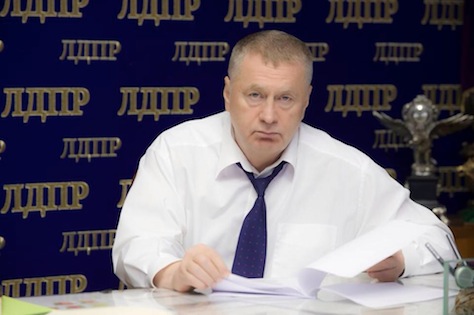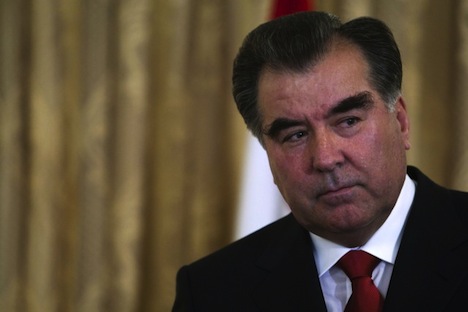Lest you think that Russia’s favorite crazy uncle doesn’t have anything to say about the latest standoff between Russia and the West, failed presidential candidate and ultranationalist loudmouth Vladimir Zhirinovsky has some choice theories about what’s holding Russia back these days — and he’s been on quite a roll in the last month or so.![]()
![]()
It’s been nearly two years since his donkey-flogging stunt during the almost-risible Russian presidential election. Though Zhirinovsky (pictured above won just 6.2% of the vote in that race, it amounts to nearly 4.5 million Russians that have stood by the colorful demagogue since he rose to Russian politics in the mid-1990s.
Not surprisingly, Zhirinovsky believes that Viktor Yanukovich remains the rightful president of Ukraine, and he urged Russia to send troops into Ukraine to support Yanukovich’s claim to the Ukrainian presidency. For the record, Zhirinovsky supports the right of Crimea to join Russia, too. (Maybe that’s because in January 2013, Zhirinovsky was pelted with pickled cabbage salad on a visit to Kiev by a woman who attacked the flamboyant politician as a ‘Ukrainophobe.’)
But the most curious attacks recently have come with respect to another area of Russia’s ‘near-abroad.’ Last month, Zhirinovsky called for Russia, in essence, to annex five entire countries — Kazakhstan, Uzbekistan, Tajikistan, Turkmenistan and Kyrgyzstan — as Russia’s ‘Central Asian Federal Region,’ with a capital that should be known as ‘Verny,’ a Russian word for Almaty, Kazakstan’s largest city (and the city where Zhirinovsky himself was born and grew up). Even more mystifying is Zhirinovsky’s attack on the Russian letter ‘ы.’ It’s an odd sound — it’s a vowel not unlike the English ‘y,’ though the sound is apparently very difficult for non-native Russian (and other Eurasian language) speakers:
Zhirinovsky says he wants the letter removed from the Russian alphabet, calling it a “nasty Asiatic” import. The vowel came to the Russian language from the Mongols, Zhirinovsky was quoted as telling the State Duma on March 12.
“Only animals make this sound, ‘ы- ы,'” he said, adding that the regular “и” (“i”) is enough for the Russian alphabet. “Ы” doesn’t exist in any other European language, argued Zhirinovsky. “This primitive, Asiatic sound is the reason people don’t like us in Europe,” he told lawmakers.
The five central Asian nations each used to be republics in the former Soviet Union, and all of them have relatively strong ties with Russia. Kyrgyzstan and Tajikistan are candidates to join Russian president Vladimir Putin’s much-feted Eurasian Union, which is meant to be a regional counterweight to the European Union (and also to the economic power of India and China). Continue reading To ы or not to ы, Zhirinivosky asks — as Kazakhstan, central Asia worry


